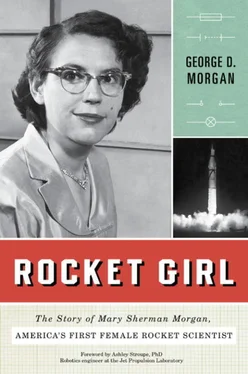George D. Morgan
ROCKET GIRL
The Story of Mary Sherman Morgan, America’s First Female Rocket Scientist
I remember, at three years old, watching Apollo 15 and seeing the astronauts drive on a non-terrestrial body for the first time. I didn’t know their names at the time, but I sensed the importance of the moment and the specialness of these people. I confidently announced that I was going to be an astronaut and go into space. My parents didn’t laugh. My mother didn’t tell me I should think about being a teacher or a nurse or a secretary instead. My engineer father never doubted that I could follow in his footsteps, nor saw any reason why I shouldn’t. They just said “Okay.” I have had that sort of support and encouragement throughout my life—from my parents, my teachers, my mentors, and my friends. I majored in physics at a technical college and completed a PhD in robotics. Today, though not an astronaut, I have gone into space as an engineer at the Jet Propulsion Laboratory.
But this world of open doors in which I was raised is not the world Mary Sherman Morgan faced. In that world, women were not considered capable of technical work. The world that I took for granted was born slowly and painfully through the perseverance, dedication, and mostly unknown efforts of exceptional women like Mary. The growing pains began in earnest during World War II. Technological and scientific advancement was essential for Western survival, but men who would otherwise hold these jobs were suddenly overseas. The vacuum was filled by those left behind—women like Mary, who insisted on taking every science class in school despite all objections. For the first time, women were given opportunities to apply these skills to something other than teaching, even if, like Mary, they didn’t have advanced education. And the country had a vested interest in their success. After the war, women were expected to simply step aside and slip back into the home or the classroom, and most had no choice but to do so. Some remained in subordinate jobs due to economic necessity. But some, like Mary, remained to satisfy newly found professional confidence and satisfaction, and because they now had rare expertise in new fields. As her son says, she was “determined not to be pigeon-holed” and she found a new place to apply her expertise and commitment in aviation and rocketry.
I first heard of Mary Sherman Morgan when I saw the premiere of the play Rocket Girl at Caltech in 2008. Parts of the story her son George told were familiar to me from history—skepticism of her abilities, lack of recognition, low pay, and being the only woman in her environment. But what is unique about Mary is that she let her achievements speak for her. She didn’t fight a public battle about whether women could or should do the work—she just did the work. Perhaps she thought a woman’s work would not be trusted. Perhaps she knew that attitudes can’t be changed by force or by confrontation. She slowly and subtly changed the attitudes of the men (and women) around her by simply, quietly, being herself.
Unlike Mary, I never faced the still predominantly male world of engineering as the only woman. I did, on occasion, encounter those who believed women were not as capable, but I was able to dismiss them and not let their doubts become mine. While workforce equality has some way to go, there are few “firsts” left for women to conquer. By reading Mary’s story, we are reminded how far we have already come and, more importantly perhaps, we may learn how to successfully complete the journey. When George asked me to write this foreword, I wondered what Mary, who shunned public and professional recognition, would think. I hope that she would appreciate the need to celebrate those like her who persistently aspire to, and do, achieve something extraordinary—not extraordinary for a woman, but extraordinary unqualified. And in this new world Mary helped create, that is something to which we all can aspire, while simply, though not necessarily, quietly being ourselves.
Ashley Stroupe
Ashley Stroupe, PhD, is a robotics engineer at the Jet Propulsion Laboratory in Pasadena, California. She performs research and supports operations of spacecraft. In 2005 she became the first woman to remotely drive a vehicle on another planetary body. She is currently one of a handful of “pilots” trained to drive the Mars rovers .
This is a story about a mother who never talked to her children. This is a story about a wife who rarely talked to her husband, though they were married for fifty-three years. This is a story of a woman who desperately wanted happiness but could never summon the strength to reach for it. This is a story of a woman who had a family that loved her, but who struggled to love them in return. This is a story about a woman whom people admired but could never get close to. This is a story of a woman who harbored many secrets and lived in daily fear that those secrets would one day be revealed. This is the story of a woman who took those secrets to her grave. This is a story about America’s first female rocket scientist.
This is a story about my mother.
Mary Sherman was born on November 4, 1921, on a small farm in a remote corner of North Dakota. There is no record of who was present that day, as the Shermans were never great record keepers. On August 4, 2004—eighty-two years later—Mary was admitted to the emergency room of West Hills Hospital in West Hills, California, with chest pains. Her husband (my father), G. Richard Morgan, was by her side. An hour later, Mary was dead. There is no record of who else except my father was present, as the Morgans have never been great record keepers. They wheeled her body out of the room, and a nurse collected the possessions she left behind: a handful of home-sewn clothing, fifty feet of clear plastic oxygen tubing, and a plastic bag overflowing with exotic medications.
That afternoon, my father began calling his children, which included my brother, Stephen (a long-haul trucker), my sister Monica (a draftsman living in Oregon), and my sister Karen (a government health worker in nearby Orange County). He called me last and asked that I write Mary’s obituary for the Los Angeles Times . I told him I would be honored.
I did not expect any challenges writing her obit. Even though my mother always refused to discuss her 1950s top secret Cold War work with any of her four children, we had learned quite a few things from eavesdropping on little snippets of conversation between our parents and their friends. We knew, for instance, that our mother had been a rocket scientist, that her work included designing new and exotic rocket propellants, and that she had made several historical achievements that helped usher in the Space Age. Taking this obituary assignment most seriously, I interviewed my father, found out a number of things I never knew about my mother, wrote the obit, and submitted it to the Times .
I assumed that getting her obituary published would be a slam dunk, given that my mother was the inventor of hydyne—the rocket propellant that boosted America’s first satellite, Explorer 1 , into orbit. Her invention had helped rescue America’s tarnished reputation in the wake of Russia’s launch of Sputnik 1 and 2 . It was a significant milestone in the history of America’s space program, especially since she had been the only woman out of nine hundred engineers, and she didn’t even have a college degree.
Читать дальше














